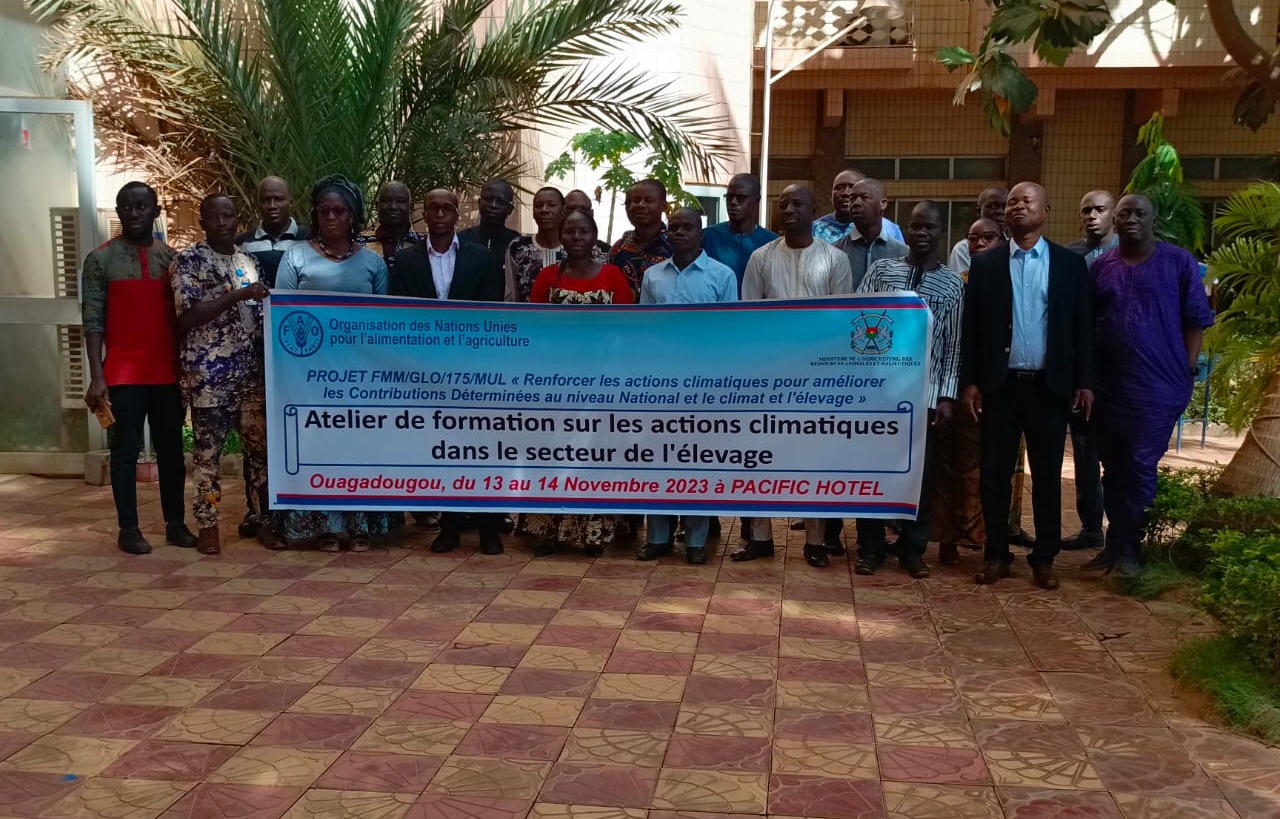Implementing climate action in the livestock sector in Burkina Faso
Two events to improve stakeholder capacity and collaboration in implementing climate action in the livestock sector in Ouagadougou, Burkina Faso.

©FAO/JeanAyabagabo
The Food and Agriculture Organization of the United Nations (FAO), in collaboration with the Ministry of Agriculture, Animal Resources, and Fisheries of Burkina Faso, organized a hands-on training and workshop on livestock and climate change as part of the FAO Flexible Voluntary Contributions (FVC) subprogramme on "Scaling-up climate actions to enhance Nationally Determined Contributions and climate and livestock”.
About the events
The workshop, held in Ouagadougou from 13 to 16 November, sought to bolster mitigation and adaptation commitments in Burkina Faso's livestock sector. The event aimed to align national policies with the goals of the Paris Agreement, enhancing climate resilience, food security, and livelihoods. These comprehensive training and workshops were designed to deepen stakeholders' understanding and foster collaboration in implementing climate actions within the livestock sector.
New FAO report: Livestock climate actions in Burkina Faso
Burkina Faso has committed to reducing greenhouse gas emissions by 29 percent by 2030, compared to business as usual scenarios, through its Nationally Determined Contribution (NDC). Although agriculture and livestock have been identified as sources of greenhouse gas emissions, livestock-specific mitigation and adaptation measures are under-represented in the current national climate actions of Burkina Faso. FAO has recently published a new study that analyzes Burkina Faso's climate and livestock policies to determine their alignment with NDC. The document provides also recommendations for policy development.
Background
Burkina Faso's rural economy heavily relies on the livestock sector, engaging almost 56 percent of households. However, the sector faces challenges due to climate change impacting productivity and sustainability. Livestock, particularly ruminants, contribute to climate change through greenhouse gas emissions. Burkina Faso, recognizing these challenges, is committed to reducing greenhouse gas emissions, emphasizing effective mitigation and adaptation measures in the livestock sector.
Next steps
The events saw an active participation of diverse stakeholders, including government representatives, academia, the private sector, and NGOs. The training achieved its objectives, enhancing participants' understanding of climate change issues and introducing the climate-smart livestock approach. Additionally, participants received training on greenhouse gas assessment tools. The consultation workshop facilitated discussions on challenges, opportunities, and good practices, identified priorities, and explored climate-related financial opportunities.
Follow-up actions include the development of a concept note for further training initiatives. Furthermore, another workshop will be organized to identify project ideas and explore Burkina Faso's potential to access climate funds, such as the Green Climate Fund (GCF) and other donors. Recommendations emphasized the operationalization of the identified climate actions, strengthening technical capacities of stakeholders, using IPCC Tier 2 method for upcoming greenhouse gas inventories for the livestock sector, and improving the monitoring of pastoral resources, among other key actions.
The successful implementation of these events contributes to FAO's strategic framework, FAO climate change strategies, the Sustainable Development Goals, and Burkina Faso's commitment to addressing climate change in the livestock sector as part of the Paris Agreement goals.
